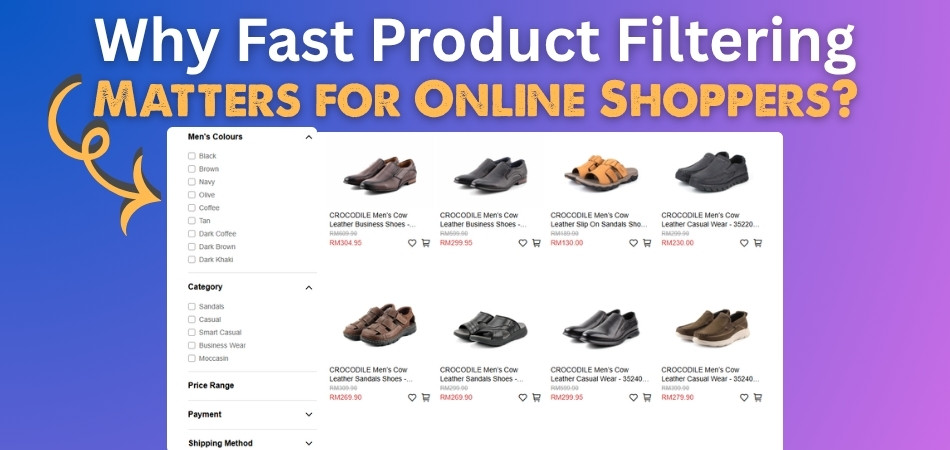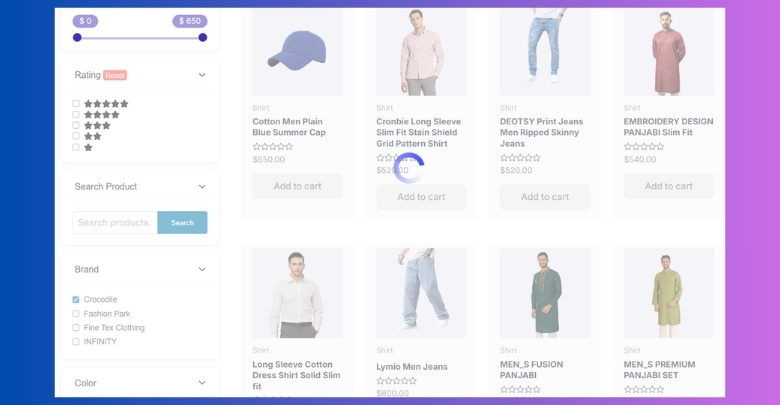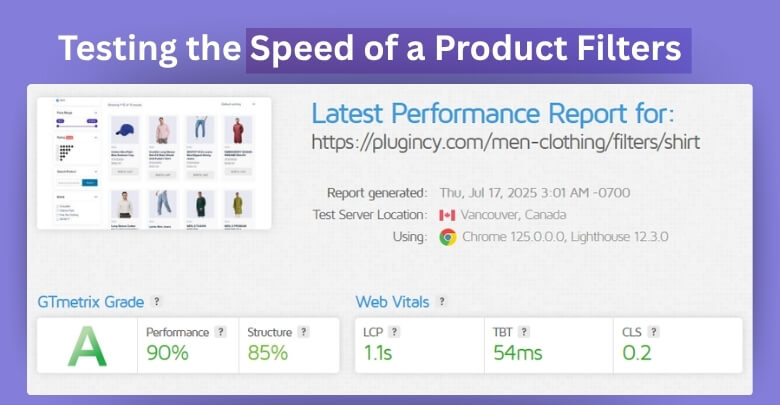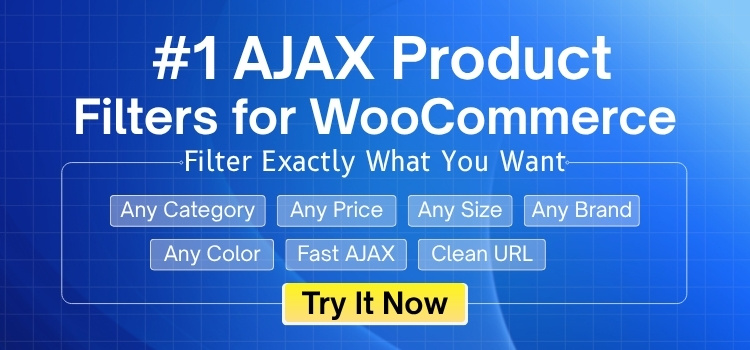Online shops are supposed to be fast, fun, and easy to use. But when pages take too long to load or filters don’t work right, people get annoyed and leave. That’s when many start wondering why online stores feel slow, and more importantly, why fast product filtering matters for online shoppers.
Fast product filtering helps shoppers find items quickly and easily. It saves time, reduces frustration, and makes shopping more fun. It also personalizes the experience, enhances sales, and helps stores understand what buyers want through smart filter data.
Want to know what causes filter delays or how to make them faster? If you’re curious about how to improve filtering speed and make shopping better for everyone, this article has everything you need to know. Keep reading to explore all the simple but powerful ways to fix slow product filters.
Why Fast Product Filtering Matters for Online Shoppers?
Shopping online should feel quick and easy, but sometimes endless scrolling makes it tiring. When stores have thousands of items, finding what you want shouldn’t take forever. Let’s look at why fast product filtering really matters.

Saves Valuable Time
People usually know what they want when they shop online. Maybe it’s a blue hoodie or a size 9 sneaker. Without good filters, they’d have to scroll through pages of stuff they don’t need. Quick filters help them skip the mess and get right to the point. It’s like using a shortcut to find the exact product faster, and tools like WooCommerce Ajax product filter can quietly help make that process smoother.
Reduces Frustration
It’s annoying when you can’t find what you’re looking for. Slow or poor filtering makes things worse. If people have to dig through random items, they might give up and leave the site. Good filtering keeps things calm and simple. When shoppers can quickly see what fits their needs, they stay longer and feel better about the store.
Makes Shopping Fun
Sometimes people find things they didn’t even know they wanted. Filters help them try out different options, like colors or styles, just to see what’s out there. This little bit of exploring can be fun and might even lead to a surprise buy. That’s the beauty of fast filtering; it doesn’t just help you find things; it opens up more cool choices.
Feels More Personal
Every shopper has different needs. Some care about price, others about color or size. Filters let people choose what matters to them. This makes shopping feel more personal, like the website understands what you want. When the store feels right, you’re more likely to trust it and buy something.
Helps You Buy Faster
Faster access to what shoppers want increases their chances of adding it to their cart and completing their purchase. Long searches can make people tired or change their minds. Fast filters cut out the waiting and lead them straight to what they need, which means fewer abandoned carts and happier buyers.
Shows More Products
Stores usually have way more stuff than what’s on the first page. Filters give all products a fair shot at being seen. Even the ones that aren’t top sellers can pop up if they match the filters. This is helpful for shoppers and also good for sellers trying to move all kinds of stock.
Gives Smart Feedback
Stores can learn a lot from how people use filters. If lots of people filter by “red shoes” or “under $20,” that tells the store what’s popular. This info helps them stock better products and run better deals. It’s a win-win — customers get what they like, and stores get better at selling.
Fast product filtering makes online shopping quicker and easier for everyone. It helps people find what they want without any stress. Stores benefit too, with more sales and happy customers. That’s why having good filters is a smart move for any online shop.
The Psychology of Speed: Why Online Shoppers Hate Waiting?
Nobody likes waiting, especially when shopping online. A few extra seconds can feel like forever when you’re excited to buy something. Speed plays a big role in how we feel while browsing. Let’s see why even short delays can ruin the experience and what makes people leave a website so quickly.
- Even a two-second delay while loading a page can make people feel like the site is broken or not working properly.
- When pages take time to load, shoppers often think the website isn’t trustworthy or safe to use for buying anything.
- Delays interrupt the natural flow of shopping, making people lose interest in what they were just excited about.
- If the product page takes too long to open, people may feel bored and quickly close the website without thinking twice.
- Waiting for filters or images to load can feel frustrating, especially when you’re ready to buy something right away.
- Long loading times can make shoppers wonder if there’s something wrong with their internet, even if it’s not their fault.
- People expect fast results, so even small delays feel much longer and more annoying than they really are.
- Slow sites make shoppers feel like their time isn’t being respected, which pushes them to go shop somewhere else.
- If checkout is slow, buyers might think twice about giving their payment details and just leave the cart behind.
- Quick sites make everything feel smooth and easy, while slow ones create doubt, stress, and a reason to leave.
Speed matters more than people realize when it comes to online shopping. Every second counts, and every delay can push someone away. A fast website keeps trust high and shoppers happy. That’s why speed should always be a top priority.
Why is Ajax-Based Filtering Important for an Online Shop?
Online shopping should feel quick, smooth, and easy. But when every click causes the page to reload, things start to feel slow and annoying. Nobody wants to wait again and again just to apply a simple filter. That’s where a smarter solution makes all the difference — let’s break it down.
No More Page Reloads
Whenever you click a filter like size, color, or brand, the entire page reloads, which wastes time. That tiny delay adds up and breaks the flow of shopping. Ajax filtering stops this from happening. Instead of reloading the whole page, it updates just the parts you need. It keeps everything fast, so shoppers can focus on the products, not the wait.
Feels More Interactive
A website that responds instantly feels more modern and easier to use. Shoppers enjoy it more when things work right away after they click. When a site doesn’t pause or freeze between filters, it makes everything feel smooth. Many successful online shops rely on faster filtering with AJAX technology to deliver real-time results and eliminate unnecessary page reloads.
Raises Buying Confidence
People like shopping when things are simple and fast. If they keep running into delays or slow filters, they might think the site isn’t reliable. Quick updates help build trust. They make users feel like the website is well-made, which makes them more confident to browse and eventually buy what they want without second thoughts.
Works Better on Phones
Lots of people shop from their phones now, and slow pages are even worse on small screens. Clicking and waiting for reloads feels even more frustrating there. Ajax filtering helps by cutting down on extra steps and keeping everything light and fast. It makes mobile shopping feel just as smooth as shopping on a computer.
Helps Stores Sell More
People tend to browse more when they enjoy the shopping experience. That means they may buy more than just one thing. Fast filtering helps them check out more options in less time. And when they’re happy with how easy it is, they’re more likely to return and shop again, which helps the business grow.
Fast, responsive filters make online shopping feel better for everyone. A small upgrade in speed can lead to more trust, more clicks, and more sales. That’s why Ajax-based filtering is such a powerful tool. It’s a simple change with a big impact.
Technical Reasons Behind Slow Product Filters for an Online Shop
Online shopping should be quick and smooth, but sometimes filters take forever to load. When this happens, people get frustrated and might leave the site. These slowdowns usually come from technical problems behind the scenes. Let’s explore what actually causes these filter delays and how they can be fixed.

Weak Server Power
Some online stores run on shared or cheap servers that can’t handle too much traffic. When too many people visit or apply filters, the server struggles to keep up. That’s when pages load slowly, or filters stop working. Stores with stronger hosting setups perform better, especially during sales or busy times when everyone’s online at once.
Poorly Written Queries
Filters depend on database queries to show the right products. If those queries are messy or not set up well, it takes longer for the site to find the results. This delay affects the whole shopping experience. One way to overcome these technical bottlenecks is by understanding the value of advanced Ajax filtering systems in WooCommerce, which offer smoother interactions and faster load times.
Too Many Plugins
Adding lots of plugins might seem helpful, but it can actually slow everything down. When too many plugins are working at the same time, they can clash with each other. This causes bugs and delays, especially with product filters. Keeping only the most useful plugins and checking for conflicts can help speed things up.
Outdated Software
Old versions of software, themes, or plugins often don’t work well with new features. They can slow things down or even break filter functions. Regular updates are important to make sure everything runs properly. A website that stays updated usually feels quicker and more stable for shoppers using filters.
Heavy Product Data
Some shops have too many product options, sizes, or custom features loaded all at once. If the data isn’t well organized, it can slow down filters. It’s like asking the site to search through a huge, messy box instead of a clean list. Cleaning up product data and only showing needed details can make a big difference.
Slow filters aren’t always about bad design—they’re often caused by technical issues that can be fixed. A few smart changes can help filters run faster and smoother. That means better shopping for users and better results for stores. Speed really does matter.
How to Test the Speed of Your Product Filters for Online Shops?
Testing the speed of your product filters is super important if you want your online shop to feel fast and easy to use. A slow filter can make people leave, even if your products are great. Let’s look at some simple ways to check how well your filters perform.

Use the Lighthouse Tool
Lighthouse is a free tool built into the Chrome browser that shows how fast your site is. It checks things like page speed, filter load time, and how quickly the screen updates after clicking. You can open Chrome DevTools and run Lighthouse on any page to get results in seconds. It’s a smart way to catch filter speed issues early.
Try GTmetrix
GTmetrix is another easy-to-use tool that helps test website speed. It gives a detailed report, including how long it takes for filters to load. You just enter your website link, and it shows what’s slowing things down. It also gives tips to improve speed. You don’t need any coding skills, and it works well for testing both homepages and product filter pages.
Manual Filter Testing
Manually testing your filters means trying them yourself, just like a shopper would. Pick a product category, apply filters like color or size, and see how fast the page updates. Do this on both phone and desktop to compare. This simple method helps you feel what your visitors feel and notice delays that tools might miss.
Use Website Analytics
Some tools, like Google Analytics, show where visitors slow down or leave. If many users drop off after using filters, it might mean they’re too slow. You can also track which filters get used the most and check their speed. Watching this data helps you find and fix problems that stop people from buying.
Compare With Competitors
Check how fast your filters work compared to other online shops in the same space. Visit their sites, click around, and see if their filters load faster than yours. This helps you know where you stand and what to improve. A faster experience can help your shop stand out from the rest.
Testing product filter speed is one of the easiest ways to improve your online shop. It helps you catch slowdowns before they drive people away. Even small fixes can make a big difference in how smooth your site feels. Keep testing often to make sure your filters always stay fast and reliable.
Commonly Asked Questions
If you’re still curious about how fast product filtering can improve your store, you’re not alone. These common questions cover what we haven’t already discussed and offer clear, simple answers to help you understand things better.
How Does Fast Filtering Affect Customer Loyalty?
Fast filtering makes shopping feel smoother and more enjoyable. When people can quickly find what they want, they are more likely to return to the same store next time. It builds trust and shows that the store cares about their time. That trust often turns into long-term loyalty.
Can Fast Filters Help During Big Sales?
Yes, fast filters are very helpful during sales or busy shopping days. When hundreds of people are browsing at the same time, slow filters can crash or freeze. Quick filters handle more users better, keeping the store running smoothly. That helps customers buy more without problems.
Do Filters Work Differently on Large Stores?
Large online stores usually have more items and more filter choices. If filters aren’t fast, the website can slow down quickly. That’s why big stores need strong and fast filter systems to manage the load. Good filters make it easier for people to find what they want, even in huge catalogs.
Is Filter Speed Important for New Online Shops?
Yes, even small or new shops need fast filters. If a store feels slow, people might not give it a second chance. Fast filters make the shop feel more professional and trustworthy from the start. That can help new stores grow faster and earn more sales.
Do Fast Filters Help With Product Reviews?
Fast filters can help users find products that already have good reviews. Shoppers often want to read reviews before buying, and filters can help sort products that are popular or highly rated. This saves time and builds more confidence in what they’re buying. That leads to better shopping decisions.
Can Filtering Help With Out-of-Stock Items?
Yes, filters can be set to hide or show only available items. This avoids wasting time clicking on things that can’t be bought. Fast filters make sure people only see what they can actually buy. That makes the shopping experience better and less frustrating.
What Role Do Filters Play in Product Comparisons?
Filters help narrow down choices so people can compare similar items side by side. This is useful when they want to see only specific types of products. With slow filters, it’s harder to make comparisons because it takes too long to load options. Quick filters keep things simple and clear.
Are Fast Filters Helpful for Gift Shopping?
Yes, filters are great when shopping for gifts because people often have a specific idea in mind. They may want gifts by price, occasion, or age group. Fast filtering helps them find those items without guessing. That saves time and makes gift buying less stressful.
Do Filters Help With Seasonal Products?
Filters are perfect for finding items for seasons like winter or summer. Shoppers can choose things like “winter jackets” or “summer shoes” with just one click. If filters are slow, they might not find what fits the season quickly enough. Fast filters keep seasonal shopping on track and easy.
Can Fast Filters Improve Mobile Shopping?
Definitely, mobile users have less screen space and less patience for delays. Slow filters feel worse on phones than on computers. Fast filtering gives quick results, which fits perfectly for mobile shopping. It helps people shop anytime, anywhere, without waiting around.
Bottom Line
Every online shopper wants a smooth, fast shopping experience. Filters that work fast save time, reduce stress, and help people find exactly what they want without scrolling forever. That’s exactly why fast product filtering matters for online shoppers — it makes online shopping smarter, faster, and more enjoyable.
To wrap things up, always test your filters, keep your site updated, and choose helpful tools to avoid delays. A few simple changes can lead to better results and happier customers. Keep improving your filters, and best of luck in building a faster, smoother online shop for everyone.
